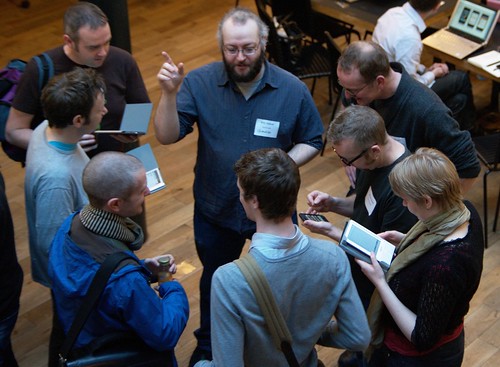I’m following the lead of my wife and son this past summer, who both read 4+ eBooks on their iPhone / iTouch devices using the free Kindle for iPhone app.
This week I started reading Naomi Klein’s book “No Logo: No Space, No Choice, No Jobs” in eBook form. According to WikiPedia’s entry, Klein:
… is a Canadian journalist, author and activist known for her political analyses and criticism of corporate globalization.
I think I first heard from and about Naomi Klein when I watched the 2003 Canadian documentary, “The Corporation,” which I highly recommend. (I watched it via NetFlix.) I found that video/film recommendation on Larry Lessig’s wiki page for “Required Viewing” on the subject of corruption, and figured if Dr. Lessig thinks it’s a film important to watch, I probably need to see it. I’m glad I did. My February 2008 post, “The Corporation documentary: A big eye opener,” provides more background on my thoughts in response to the movie and its extended features. (Extra interviews.)
So far, Klein’s book “No Logo” is both informative and thought provoking as well. Here’s a paragraph from my reading tonight that conveys well why I find these topics so important and compelling as an educator interested in media literacy as well as an avid blogger and social media user.
Rather than merely bankrolling someone else’s content, all over the Net, corporations are experimenting with the much-coveted role of being “content providers”: Gap’s site offers travel tips, Volkswagen provides free music samples, Pepsi urges visitors to download video games, and Starbucks offers an on-line version of its magazine, Joe. Every brand with a Web site has its own virtual, branded media outlet– a beachhead from which to expand into other non-virtual media. What has become clear is that corporations aren’t just selling their products on-line, they’re selling an new model for the media’s relationship with corporate sponsors and backers. The Internet, because of its anarchic nature, has created the space for this model to be realized swiftly, but the results are clearly made for off-line export.
I really don’t like to use the word “hate” at all, so I hesitate to say “I hate advertising.” It is definitely accurate to say I STRONGLY dislike advertising. I’m convinced we all should strive to live our lives with digital discipline, and part of disciplining ourselves digitally means taking assertive control of the images and messages we allow into our eyes, ears, and brains. DVRs are a wonderful invention for digital discipline. I personally watch very little television, but when I do (or our children do) I think its wonderful to watch recorded shows so TV advertisements can be skipped. The only exception to this, of course, is live sports– but other than that I think television is best consumed via DVR.
My strong dislike for advertising has, to date, influenced me to NOT run any type of ads on my blog. I’ve been paying $100 per month for a virtual private server to host my blog for 10 months now, since facing a situation which felt like extortion, and I’ve definitely wished more than once that my blog directly generated income which would offset those costs. I think the value and benefit of my blog still outweighs these increased hosting costs, but I admit this perception is based on more than a little faith and hope. Relevancy on the radar screens of others in our attention economy is a compliment, an honor, a responsibility, and a tangibly valuable thing. At this point, I’m still content to proudly run and freely offer my ideas via this blog sans advertisements.
Naomi Klein’s words in the above paragraph highlight important changes which have and continue to take place in the world of marketing / advertising as well as branding. I’m very concerned about schools and other organizations making deals for corporate sponsorship. I want to be and I want my children to be media literate and media saavy, so we can avoid (to the degree it is possible today) being manipulated and subconsciously influenced by phenomenally wealthy corporations and individuals who have the means to craft and share media messages in places where our eyes travel.
I haven’t read even half her book yet, and I can’t offer any definitive opinions on either her book or her thesis, but I can suggest that critically consuming media is an essential activity for teachers and students in the 21st century. My favorite parts of our 2.5 day Celebrate Oklahoma Voices workshops are when we watch videos created by others and analyze / critique them. I firmly believe the best way to encourage a learner of any age to be a critical media consumer is to help that individual become a saavy media producer. That is a big reason I love and am passionate about Storychasers, and am increasingly convinced that we should have “Student Storychaser Teams” in every school.
I think I read a post by H. Songhai, a Philadelphia educator, some time ago in which he explained how he encourages his students to question the value of wearing corporate logoed shirts and other materials to school – Doing so for free, without being paid. I may be mistaken with this citation, and if so I apologize. I remember, none-the-less, wondering at the time just how big a deal this was and how important it is to help students think about their volitional transformations into walking corporate billboards. Klein’s book is helping me see the relevance and importance of these conversations with students with greater clarity.
The search for identity is an extremely important quest. The idea that corporations wealthy beyond the imaginations of most governments, much less individuals, are now spending billions to deliberately shape and influence the self-perceptions of individuals to embrace their brand as a lifestyle– and even their own identity, is both sobering and arresting.
Steven Gray’s July 2009 article for Time, “Can Corporate Funding Save Endangered College Classes?” is another road sign of our times with regard to corporate branding and media brainwashing. Gray wrote:
Faced with an estimated $25 million budget deficit, the school’s [The City College of San Francisco] chancellor, Don Griffin, has proposed eliminating 800 of the school’s roughly 9,800 classes for this fall. Last month, however, he proposed a novel potential solution: saving the classes with corporate sponsorships of up to $6,000 per semester. So far, the reaction in San Francisco has been mixed. Some officials at the college view the proposal as unseemly, but acknowledge its potential practicality in the absence of sufficient government funding. “We have to go after private money, but in a thoughtful way that doesn’t compromise our values — or let the public sector off the hook,” says Milton Marks, president of the college’s board, which is expected to review a formal proposal later this month.
An institution of higher learning concerned with compromising values in our day of almost boundless pursuit of money in intercollegiate athletics?! Of course corporate sponsorship of an academic course would compromise values of academic integrity. It is naive and foolish to think it could not. I was not able to readily find a followup to this story about CCSF. If you have an update, please let me know. This is a sad case, but unfortunately we’re likely to see more of this sort of thing as the corporate drive to “brand” the world drives on almost unabated.
I really, really resent and dislike the invasion and attempted co-optation of social media platforms like Twitter by commercial marketers. I wrote a bit about this Sunday night in the post, “Spam Twitter Followers Proliferating.” Sean Gregory’s Time article on Wednesday, “How to Make Money on Twitter: Do Commercials!” makes me physically ill. Gregory wrote:
Thanks to companies that are desperate to reach consumers in the social-media crowd, it’s now possible to make a buck or two — or much more — on Twitter. A company called IZEA, which made its name connecting bloggers with companies willing to compensate them for plugs on their sites, has set up a similar service for the Twittersphere. At the appropriately named site Sponsored Tweets, Twitter users can sign in, set the price they want companies to pay them for the privilege of tweeting an ad on their behalf, and wait for the offers to come in.
I am all for entrepreneurship and innovative ways to make money, but schemes to fill the digital ether with yet MORE advertising and spam sounds like an idea as sound as a ocean liner made of tissue paper. Symantic reported this past May that over 90% of email is now spam. Does Sean Gregory think it would be great if we could say the same thing about Twitter? Lots of folks already think Twitter is filled with useless lifestream data. Should we supplement those posts, or even overwhelm them, with more advertisements? To this proposal, I offer an unequivocal NO.
We live in a regulated market economy, and I am a big fan as well as proponent of capitalism. I am decidedly not (even though I did work for a multinational telecommunications company for two years) a blind advocate for unregulated corporate power and corporate-influenced legislation, however. The twenty minute video, “The Story of Stuff,” has a lot to say about these themes. If you haven’t taken time to watch it yet, I highly recommend you do. The themes of the film (and forthcoming book) definitely go beyond corporate branding and advertising, but those issues are closely tied to the issues of overconsumption, environmental protection, governmental corruption, limiting corporate lobbying, etc.
I’m looking forward to continued reading with Naomi Klein in the weeks ahead related to these topics. Long live the eBook, and long live blogs!
Technorati Tags:
book, college, digital, ebook, economics, economy, education, corporation, branding, ad, ads, advertising, marketing, naomi, klein, logo, nologo, advocacy, activism, discipline, digitaldiscipline, sponsor, sponsorship, regulation
If you enjoyed this post and found it useful, subscribe to Wes’ free newsletter. Check out Wes’ video tutorial library, “Playing with Media.” Information about more ways to learn with Dr. Wesley Fryer are available on wesfryer.com/after.
On this day..
- 1st Day of STEM Makers Studio: Success! – 2014
- Falco on Demand – 2011
- Advocating for balanced approaches to Internet filtering in schools – 2009
- Transferring cell phone recorded audio (voicenote) to a Mac computer – 2009
- Want a successful laptop initiative? Better choose Mac laptops! – 2008
- CustomGuides: Free how-to tutorials ready to use – 2008
- Free Mobile Alerts: One-to-many text messaging and voicemail – 2008
- Kozol on NCLB and the struggles of real teachers – 2007
- Podcasting 101 – 2005



Comments
2 responses to “Branding, Advertising, and the Attention Economy”
I found your post very interesting. I am a recent college grad and I chose to pursue marketing as my course of study. I think advertising can be used for evil, but I think there are a lot of positive externalities of advertising in society. For instance it generates consumer demand, which fuels the economy, which generates revenue for the government, which helps fund schools.
I believe you are a fan of the Apple iPod touch as a tool for education. Well if Apple did not run advertising to promote the iPod, their sales would be much lower, and developers would have a much lower incentive to develop useful education applications.
Thoughts?
[…] Fryer’s education blog The Speed of Creativity discusses why people hate advertising. I really don’t like to use the word “hate” at all, so I hesitate to say “I hate […]